#symptom of academic trauma
Text
every time I draw pannacotta fugo in sketches he’s always just holdin papers n shit 😭
#he has so much paperwork#like it’s always no matter what whether it’s pre-VA or post-PHF bro is always holding paperwork#tax documents and shit#even though he’s like 16#Bruno lets him do it because if he doesn’t have paperwork to do he starts going insane#symptom of academic trauma#fugo when he has time off: im going to do Math. i will not be taking a Break. i do not Need it. let me do Taxes.#He’s always found passed out in the office#lil guy doesn’t know how to have fun on account of all the PTSD and other issues#doing paperwork IS how he has fun#Bruno’s like I’m worried he’ll wear himself out if he doesn’t have time to relax. I’m not giving him any paperwork so he can take a break#and abbacchios like you and I both know he can’t do that. the kid will start killing people if he can’t do paperwork.#just give him the income statements or some shit he’ll be fine.#bruno gives him a crossword book and it keeps him occupied for like 3 hours#but the second his break is over he appears at Bruno’s location and is like I’ve done the crosswords. I need to do Work now or I’ll explode#jjba#vento aureo#golden wind#amby yells#pannacotta fugo
42 notes
·
View notes
Text
so tired of the noise in my head. getting randomly triggered for the most random of memories, positive or not.
#blurry.txt#i dont know who is active or dormant anymore or who is responsible for what#i think we have far more doubles than we initially thought#i think we have academic helper [redacted] and academic trauma holder [same] and symptom holder [same] and childhood memory holder [same]#but i dont know if theyre related or not#its very confusing and i feel like im trapped in six memories at once
1 note
·
View note
Text
if you think people are more empathetic to women than men you are straight up fucking delusional. men have proved themself almost INCAPABLE of empathy for women, and this is statistically and empirically supported. they are incapable of understanding that women have an internal life, do not see us as humans with emotions who exist external to them.
look at the comments on a post of a man talking about self harm vs a woman. "men's mental health matters too🥺" "I'm proud of you" vs "attention whore" "sideways for attention downwards for results" "ugly bitch trying to get sympathy"
this is what happens for ANYTHING regarding sexual assault, mental health, suffering, trauma.
or an overweight man vs woman
"keep your head up king👑" "you got this bro, I believe in you" "these women don't deserve you." (like totally unprompted not discussing relationships) Or often no comments on his weight at all if he's not talking about it.
For a woman, no matter WHAT she is posting about "landwhale" "starve yourself" "put down the burger" "kys fat b*tch" and the most vile and insanely cruel comments
The amount of threads and forums dedicated to eviscerating degrading and insulting overweight women on places like lolcow and kiwi farms and just social media in general and I genuinely have never seen one for a man.
Same thing with things like facial deformities, the comments are unbelievably cruel to these women.
the level of vitriol is not even remotely comparable, and I don't even think it's mostly a double standard. I think they just lack the capacity to feel empathy towards women and perceive them as human and capable of feeling pain. Things are solely perceived in how they relate to them and thought to be performances for men. Women exist to serve them and if they don't give them a boner they don't deserve to be alive. If something, no matter how innocuous, pisses them off in the slightest they don't have a single qualm because they just don't view them as real people and full human beings with internal lives. women having emotions is inherently manipulative, anything they say or do is a performance for men.
And like look at things such as the gender credibility gap
https://www.tedxmilehigh.com/gender-credibility-gap/
Women are systematically less believed as witnesses in a courtroom, reporters, academic authorities, in claims of sexual assault, discrimination, or harassment.*
Women's reports of pain symptoms are less likely to be believed by doctors, and they are staggering more likely to not receive proper medication, go undiagnosed and untreated. Women are 32% more likely to die post-op if their surgeon is a man. "Womens' pain not taken as seriously as mens' pain. Researchers found that when male and female patients expressed the same amount of pain, observers viewed female patients' pain as less intense "(sciencedaily.com/releases/2021/04/210406164124.htm) "Nearly three-quarters of cases where a disease primarily affects one gender, the so-called “men's diseases” are overfunded, while the “women's diseases” are dramatically underfunded."
https://www.concernusa.org/story/gender-bias-in-healthcare/ https://www.washingtonpost.com/wellness/interactive/2022/women-pain-gender-bias-doctors/ https://www.medicalnewstoday.com/articles/gender-bias-in-medical-diagnosis#how-does-it-affect-diagnosis https://www.health.harvard.edu/blog/women-and-pain-disparities-in-experience-and-treatment-2017100912562
I could literally go on on this topic forever.
The gender empathy gap is a form of epistemic violence against women.
* "Suicidal behaviour and self-harm in women can be viewed by family, health professionals and the community as attention-seeking, manipulative and non-serious, which can negatively influence how young women are treated." (Curtis, 2016)
*Men with overweight tend to be perceived as wise or experienced, while women's credibility tends to decrease with excess weight... women seem to experience higher levels of weight stigmatization than men, even at lower levels of excess weight (Flint et al., 2016)
*Women are at greater risk for weight/height discrimination than men (Puhl et al, 2008)
*so many papers on this but "Across the board, women are perceived to be less credible than men. Especially women’s testimonies of rape and sexual harassment are widely trivialized and disregarded, even though reports of sexual abuse are not more likely to be false than reports of other crimes" (Schreurs, 2020)
more like Mack, 1993
987 notes
·
View notes
Text
Aang, Psychology, and the Concept of “Running Away” (A Breakdown Of Aang's Trauma Responses)
So, one thing that always kind of threw me off about atla was Aang's ignoration and dismissiveness of the things that have happened to him and continue to happen to him. He never seemed to have any kind of trauma response (besides nightmares).
Recently I've realized that the ignoration is Aang's trauma response, and it runs pretty fucking deep. Aang shows a lot of trauma responses but they are not as noticeable because Aang is also ridiculously good at emotional regulation, to a toxic point imo, and probably due to his upbringing by monks.
Aang, as is pretty well covered by the show, has a problem with trying to 'run away’ from his problems. This steadily stops happening as much throughout Book 2 (though he is learning in Book 1), but what's interesting is, while his tendency to physically run away from problems ends, his tendency to emotionally run away increases.
We go from Book 1 in which Aang confides in Katara about the separation from the monks, to Book 2 in which Aang literally actively rejects attempts at comfort in favor of an emotional shut down, to Book 3 where, after the failed invasion, Aang immediately tries just about anything he can to avoid talking about it.
He's not necessarily 'running away’. He still owns up to his duty and is right on the ball when Zuko shows up to teach firebending. It is not the work he shies from, it is specifically talking about the failure. This is Aang's main trauma response. Before I delve deeper into that though, I want to talk about Aang's other trauma responses that get bypassed thanks to his ability to ignore them.
Quoting ‘What is Child Traumatic Stress’, “Traumatic reactions can include a variety of responses, including intense and ongoing emotional upset, depressive symptoms, anxiety, behavioral changes, difficulties with attention, academic difficulties, nightmares, physical symptoms such as difficulty sleeping and eating, and aches and pains, among others.”
Aang shows almost all of these at one point or another, and typically they show themselves when he finds himself incapable of mentally 'running away.’
Intense and Ongoing Emotional Upset:
I'm mostly eyeing the avatar state episodes. His immediate reaction to traumatic events he is helpless to is explosive anger, but it fails to be ongoing because it is immediately followed by a shut down.
- Aang on Zuko's boat. In this episode, while fighting with Zuko, Aang shows some pretty intense fear and his first (technically second) experience with the Avatar state is for survival and driven by fear (also, notably, a repeat experience of the same thing that caused the actual first experience). Yet, as soon as Aang is off of Zuko's boat, he's melancholy for a hot second and then turns on a dime and starts talking about the adventures they can go on. Avatar State -> Shut Down/dismissing or ignoring the problem.
- Aang at the Southern Air Temple. He starts off in deep obvious denial, like this kid is so obviously blocking. Then he sees Gyatso's body, goes into a rage and grief induced Avatar state, gets pulled out, can no longer use denial as his mental defense, and so once again turns to shut down. He's expressionless as he comes down, and when he's fully out he's just kind of tired and speaks with a soft almost toneless quality. He's admitting to the trauma and yet there's a numb resignation to it. He's not emotionally connecting with it. We see him after with Momo and Appa smiling and just being like “we gotta stick together :)”. That's not the appropriate response to admitting there's only three survivors of your home. Avatar State -> Shut down/dismissal
- Aang and General Fong. Aang experiences an extremely distressing and helpless situation while he watches Katara, one of two whole people in his life, be buried. He goes into a rage induced Avatar state, again, and then literally 'nope's out of the situation with help from Roku. And when he comes back, he shuts down. He doesn't react emotionally, he once again speaks in that soft, even, almost dead tone, apologizes, and dismisses the event. I mean, the way he addresses General Fong, the person who just caused this whole thing, is extremely chill, almost uncharacteristic. Just a simple, “you're out of your mind” with a tone that could make you think he was having a casual conversation with someone who just suggested eating cereal out of a cup. And then he's good! Momo comes back and he smiles and everything is all good again. Avatar State -> Shut down/dismissal.
- Then we have the desert, one of the few times Aang does not shut down immediately, but then it culminates in the Avatar State and he stays like that for a bit but once he comes down, his faces changes again, to what is almost resignation, like he's given up on being mad, which really, he has as we see later. And then the next episode and he's playing in some water, but as soon as Sokka brings up Appa, we see the face and tone that's now kind of familiar: soft, dead, dismissive. He's once again refusing to emotionally connect and is downplaying it. Avatar State -> shut down/dismissal.
Depressive Symptoms/Anxiety:
He shows fits of both, though these aren't as evident because, again, most of the time he's in an emotional block and ignoring the problems. But when he cannot ignore the absence of his lifelong companion, he has a long period of anger followed by a numb depressive state, he literally talks about giving up hope. He is entirely hopeless at this point.
And then when he cannot ignore the Day of Black Sun coming in a few days, his anxiety goes through the fucking roof.
However, these don't last long and that'll connect to me talking about emotional regulation later.
Behavioral Changes:
Aang changes A Lot over the course of the series. Book 1 Aang is very distinct from Book 3 Aang (though we still see the core traits of him throughout). He becomes more hyper focused on doing his duty, tends to fall to the background when he can, generally takes on a much more somber demeanor.
Difficulties With Attention:
This one's not really huge. He has about the same amount of attention focus in Book 3 as he does Book 1, if not improvement.
Nightmares:
I don't think I have to explain this. Aang goes through multiple fits of nightmares.
Difficulties Sleeping or Eating:
Once again, I look to Nightmares and Daydreams, one of the few times Aang is unable to shut down or block. He cannot sleep for the life of him. I have plans to go back and pay attention to eating habits in Book 3 in order to potentially add onto this joke meta, but I would not be surprised if there were signs of a lowered appetite, even if the writers did not intend it.
Aches and Pains:
He doesn't ever complain about this but also like, would he? Even if he was experiencing them? Kid tried to fight people and fly through a storm while newly recovering from a lightning injury. Aang gives no shits.
Then the article also covers childhood PTSD diagnoses which I'd also like to go over real quick. “the child continues to re-experience the event through nightmares, flashbacks, or other symptoms for more than a month after the original experience; the child has what we call avoidance or numbing symptoms—he or she won’t think about the event, has memory lapses, or maybe feels numb in connection with the events—and the child has feelings of arousal, such as increased irritability, difficulty sleeping, or others.”
Most of these I just covered, but I think it's notable that numbness is also mentioned here, the exact symptoms I've been talking about. Avoidant, won't think about it, numb in connection.
And just to be sure that everyone is on board let me go through some other examples of Aang shutting down:
Katara brings up the 100 years and Aang immediately blocks that shit. It's literally too big for him to conceptualize, so he dismisses it as okay because he has a new friend now and moves on and doesn't think about it.
The Northern Air Temple. I think most people agree that the lesson in that episode was wrong. Aang had every right to be angry. There's nothing okay about taking over and destroying 100 year old artifacts of a nearly extinct culture. We see Aang react to this with a numbness. There's even a moment where he's just frozen and uncomprehending. “This place is unbelievable.” “Yeah. It's great isn't it?” “No, just unbelievable.” He reacts with anger later (notably when he feels like he can do something instead of being helpless), and then when he can no longer do anything, he once again just rejects any negative emotional turmoil in favor of that “it's fine” attitude and accepts what the people have done.
Then the desert, one of the few places we don't see him shut down immediately. Except, literally the next episode is all about Aang's hardest shut down yet.
There are other examples but I think you get the point. He does this A Lot.
Okay cool, so we've covered the denial and trauma responses part, but how does emotional regulation play into this?
I'm glad you asked.
So, when I was first considering Aang and this whole thing, I thought Aang exhibited emotional dysregulation, especially in regards to the Avatar State, but then I actually did some learning on emotional dysregulation and realized, actually, no, he doesn't. Emotional dysregulation is mostly characterized by emotional responses being out of proportion with the event, but I think we can all agree, pm every time he goes into the Avatar State, that emotional response is uh, rather warranted. Now, Aang does, in these moments, show the lack of control that can come with emotional dysregulation, but also like, who wouldn't.
Considering Aang's behavior outside of the Avatar State Outbursts, he's actually very good at emotional regulation. Scary good, in fact. Number One in the reasons I say this is everything I said above. The ability to shut down is often an active choice. Aang does not like who he is when he is upset and, outside the initial outburst, has a pretty firm grip on his emotions. He shows anger at times, but they are in appropriate places with more or less appropriate responses.
The Desert stands out so much because Aang loses the control he normally has. This is where we see him lose his grip on himself and he spirals.
He rarely shows grief. During his lessons with the Guru he passes all the chakras with amazing ease because he legitimately is that good at controlling and managing emotions which, like I said at the very beginning, I attribute a lot of that to him being raised by monks. I mean, he's a 12 yr old who is skilled in meditation. I don't think it's a stretch to think the monks taught him other such things.
He doesn't react to small things that would normally piss people off. Examples include The Headband when he gives absolutely zero shits about the bully, and The Southern Raiders where he accepts Katara trying to steal Appa and doesn't react to Zuko mocking him and his culture.
Aang also, paradoxically, can be pretty good at expressing emotions when he needs to. He's typically very emotionally intelligent, with the exception being pretty much any trauma. He will react to basic things in the moment and is unafraid to show frustration or anger or uncertainty, as long as it's Not connected to a thing he is distinctly Not thinking about.
And one of the most damning examples of his emotional regulation skill, that is actually the scene that started me thinking about all of this, is the scene with Koh the Face Stealer.
That scene threw me off so much because I felt like it was incredibly out of character for Aang, this incredibly expressive kid, to be able to show no emotional reaction. It didn't make sense and for a long time I dismissed it as just, the writers thought it'd be cool so he did it. But of course, I can't let things lay, so I never really stopped thinking about it until I realized, in context of everything I've talked about before, it actually makes perfect sense.
Aang is emotionally expressive by choice. He has the ability to control his emotions and responses to a ridiculous degree. He knows how to be emotionally intelligent with basic things, where to express emotion and how to do it.
(Of course, he's not perfect. There are plenty of times he acts out, the Bato episode being the first thing to come to mind, but even there, after just a few hours, he has wrestled with his jealousy and responds appropriately to guilt, he owns up to it. He does try to explain himself but when Sokka makes it clear he's not going to listen, Aang does not continue to press the point. He accepts Sokka's decision, does not lash out, and for once doesn't shut down or exhibit happiness soon after. He is sad and expresses it without shoving his emotions onto others. For a 12 yr old, this is fucking impressive.)
Aang was taught well by the monks, but the one thing they couldn't teach him was response to trauma, and that's where he falters, but that emotional regulation means he's not going to respond in a typical way. Instead, he turns to denial as his coping mechanism of choice and uses those skills he learned to achieve a workable state of being but through unhealthy use.
Where am I going with this? Idk. Nowhere really, I just wanted to talk about Aang and psychology tbqh.
Anyway, I will finish this up by a fun delve into Things He's Probably Going To End Up Suffering From:
Denial can lead to memory blocking, where it's more than just not thinking about it, the brain actively suppresses and alters memory to cope. Adult Aang's recollection of the Ozai year is probably not going to be super accurate. Would not be surprised if someone was like “hey remember that time you were almost executed by a town for your past live’s mistakes?” and Aang just went “No???” and legit has no recollection of any such thing.
Selective numbing will eventually turn into collective numbing. You can selectively numb for a temporary period of time (which is how people fall into the trap) but eventually your brain will start to numb everything, not just the bad things. At the very least teenage Aang absolutely goes through a period of dissociative complete numbness.
Speaking of dissociation, if you're not going to react to trauma the normal way, dissociation happens. It starts as a coping mechanism but like with numbing, it cannot remain controlled and will develop into something. Aang will have a dissociative disorder, I'm telling you. Which one? Idk, but I assure you, it'll be there. I'm leaning toward some basic depersonalization/derealization and/or OSDD type four where trauma and meditation accidentally mix for the worse.
So yeah, there you go, a breakdown of Aang, his trauma responses, his emotional intelligence, and the consequences of those two things put together.
I'm gonna be a nerd here and add shitty citations but this is mostly in case you're also a psych geek and want to read things.
“What Are the Dissociative Disorders”. International Society for the Study of Trauma and Dissociation.
“Developmental trauma: Conceptual framework, associated risks and comorbidities, and evaluation and treatment”. National Library of Medicine.
“What is Child Traumatic Stress”. The National Child Traumatic Stress Network.
114 notes
·
View notes
Text
Headmate Role & Type Master-list (as re-posted by us to be more thorough and all system inclusive)
Below the cut is a masterlist of common headmate roles and types. We will do our best to keep this updated if we think anything else should be on here. Please let us know if there's anything you think we should add or any info we should update to be more accurate!!

Roles
Boosters
A type of headmate designed to hold or boost a certain emotion or feeling in the system, usually when fronting or co-con.
→ Confidence Booster: a headmate that boosts the confidence of the system or specific headmate(s) in front.
→ Mood Booster: a headmate that boosts the mood of the system, specific headmate(s) in front, or those around the system; emotions affected can range from neutral to overjoyed depending on the booster.
→ Motivator: a headmate that either boosts feelings of motivation in the system or specific headmate(s) in front, or helps motivate the system with encouragement.
Helpers
A type of headmate designed to help the system or individual headmates in a specific way.
→ Caretaker: a headmate who takes care of the system, generally by caring for the body or keeping the living space tidy.
→ Internal Helper: a headmate that helps take care of other headmates in the innerworld; may or may not front.
→ Soother: a headmate that helps soothe the body or other headmates, especially in times of distress or following traumatic events.
→ Supporter: a headmate who was formed to keep other headmates company; often in co-con with other headmates.
Holders
A type of headmate designed to hold certain memories, emotions, symptoms, or otherwise within a system; oftentimes fragments, but not always.
→ Anger Holder: a headmate that holds the system’s anger; might be more likely to lash out than other headmates.
→ Pain Holder: a headmate that helps deal with physical ailments in the body, such as pain or sickness; likely has an easier time handling said ailments than other headmates.
→ Symptom Holder: a headmate that holds or more strongly exhibits symptoms of mental illness or neurodivergent behaviors; may exhibit symptoms of disorders not apparent in the system as a whole.
→ Trauma Holder: a headmate that holds significant trauma; may have more vivid memory of the event(s) or memories not recalled by other headmates; often more affected by said trauma.
Protectors
A type of headmate that helps protect against various types of harm to the system.
→ Aggressor/ Aggressive Protector: a protector that’s more likely to be steadfast and have more aggressive mannerisms or methods than other protectors, but not to such a harmful degree as persecutors.
→ Emotional Protector: a headmate that protects against emotional harm and/or abuse.
→ Mental Protector: a headmate that helps protect against mental harm/abuse.
→ Persecutor: a misguided protector that tends to act harmfully towards others in the system, the body, or those around the system, whether in an outwardly aggressive or self-destructive manner.
→ Physical Protector: a headmate that helps protect against physical harm/abuse.
→ Sexual Protector: a headmate that helps protect against sexual harm/abuse.
Situational
A type of headmate that tends to front and/or is especially good at handling specific situations.
→ Academic Headmate: a headmate that is more inclined to help with academic affairs, such as homework, attending classes, studying, etc.
→ Sexual Headmate: a headmate that is highly sexual in nature; may or may not have formed to cope with sexual trauma; not considered a protector.
→ Social Headmate: a headmate that is more inclined to help with social affairs; may be more social or extroverted than other headmates.
Specialized
Headmate roles that do not fit into the above categories.
→ Host: the headmate that fronts the most and handles most day-to-day situations; may be responsible for many or most decisions.
→ Gatekeeper: a headmate that has a greater degree of control over the front than other headmates; may guard the fronting room and/or have more knowledge of the system as a whole than other headmates.
→ Manager: a headmate that has an easier time making decisions for the system; often more logic-driven than other headmates.
Types
Ages
→ Little: a child headmate aged 10 or under.
→ Middle: a tween/teen headmate aged 11-17.
-> Young Adult: an adult headmate aged 18-25.
-> Adult: an adult headmate aged 26+
-> Centenarian: an adult headmate aged 100 years or older
-> Ageless: a headmate who's age is indeterminate for any reason, including but not limited to being too old to be worth counting, in source time shenanigans, having an age that shifts frequently or varies heavily enough to not have a "true age", or being otherwise literally ageless.
Source Status
→ Introject: a headmate who formed with traits, background, or full identity of an outside source; may be a real-life source such as a person or childhood toy, or a fictional source, such as a character.
→ Sourceless: a headmate who seems to be introjected but does not have a definitive outside source or does not connect to their source at all.
-> Brainmade: a headmate that is not introjected and is instead entirely original to the brain
Types of Introjects
→ Factive: an introject who takes on traits or identity from a real person.
→ Fictive: an introject who takes on traits or identity from a fictional source, often characters in media.
-> Fictish/Factish: a headmate who is partially introjected and does not feel wholly attached to their source, and doesn't feel like just "brainmade" "sourceless" or "introject" describes the entirety of their identity or their relationship with their source.
→ Songtive: an introject who takes on traits or identity based on a song.
→ Playtive: an introject who takes on traits or identity based on a toy, usually one from childhood.
Sentience
→ Headmate: a fully sentient and independent headmate who is able to function on their own.
→ Companion: a complex established NPC, often animals, that are tied to specific headmates and often accompany them; generally can only be understood by their associated headmates.
→ Fragment: a headmate who is at least partially sentient, but not generally independent and able to function on their own; often hold specific feelings, symptoms, or memories.
→ NPC: a being in the innerworld who is not sentient or considered a headmate; named after the term “non-player character.”
Species
→ Human: a headmate who presents as a human.
→ Nonhuman: a headmate who presents as any other species than human; often as an animal, supernatural creature, or humanoid with animalistic features.
#headmate term masterpost#headmate terms#headmate role masterpost#headmate roles#headmate types masterpost#headmate types#plural resources#endo safe#💫un-gatekeeping#💫not re-blogs#💫not requests#💫resources#💫terms
94 notes
·
View notes
Note
hi there!! i've been reading some of the discussions you've had & many of them are super informative and some comforting to read from the perspective of someone who's questioning if they might be plural/have a CDD. i really appreciate ur blog & the views and experiences u share on it, it feels like a warm hug amidst The Horrors of Syscourse.
i've had something on my mind though. this is probably a silly question, but it's possible to have a CDD without (C)PTSD, right? admittedly i'm kind of just asking this for reassurance while i'm on my own discovery journey. like. i have experienced traumatic events and some of it is ongoing & i'm still living with the people responsible, but i don't think i fit the PTSD criteria due to not experiencing flashbacks or strong emotions related to the events—i usually just feel totally empty & detached from it. i still believe i've been negatively affected by the events hence considering them traumatic, but that doesn't include any kind of flashbacks.
i've been trying to look into it & find answers but i've seen a lot of conflating of having experienced trauma with having PTSD, so most of what i find is "can you be plural/have a CDD without trauma" discourse.
i think it'd be neat to see more conversations about this but free to ignore this ask if u don't want to answer it/if u don't feel equipped to! wishing u the best. have a great day!!
This is actually a very interesting question.
I've read a lot of medical literature on trauma, and each author in the field seems to define what qualifies as PTSD or PTSD symptoms differently, which also lines up with my own experiences with medical professionals in practice. In general, me simply being traumatized was enough for me to be given an automatic PTSD diagnosis, regardless of which therapist or psychiatrist I saw. Some professionals I saw were very specific with what they called what, others were a lot more loose with it.
I've seen a lot of differing definitions and academic debate over what qualifies as a flashback, dissociation, a posttraumatic symptom, and so on. That is to say, it can all be very vague.
For example, there are other forms of flashbacks that exist outside of the well-known ones; some people only relive traumatic events emotionally, or through repeated thought processes, or somatic pain. A lot aren't even aware these are flashbacks, because it's experienced as 'random' emotions or pain or spirals or some other response, and a lot have trouble figuring out what even triggers these responses.
Would these experiences fall under what we call flashbacks in PTSD? Well, it probably depends on who you ask. And, in practice, whether someone with these experiences gets diagnosed with PTSD or a mood disorder or a personality disorder or somatic pain syndrome depends on the medical professional evaluating them.
To further complicate it, a lot of people don't experience overt c/PTSD symptoms until they are no longer living in the traumatic situation, which, for people who develop cPTSD, means they may not show obvious symptoms until a very, very long time after the trauma started. I didn't start getting "classic" PTSD flashbacks and "waking up in a panic attack in the middle of the night" type nightmares about the trauma until I wasn't around the people who did it anymore. However, I have experienced many other trauma-related symptoms and heavy dissociation ever since I was very very little. Before I was diagnosed with PTSD in highschool, I was diagnosed with a lot of other things first.
There's also just the fact that, for whatever reason, people don't all develop the same symptoms in response to trauma. Some people with very complex trauma never experience classic PTSD symptoms. Some people are very dissociative and numb, or develop mood disorders, or obsessive-compulsive symptoms, or somatic symptoms, or eating disorders, or some combination of things. Some people never externally harm themselves or cope using substances while others develop addictions to these things.
In addition, some people's experiences with trauma don't fall under the PTSD criteria's definition of trauma, so even if other symptoms are present they don't "technically" fit criteria. And sometimes medical professionals use their own judgement and diagnose these people with PTSD anyway, and sometimes they don't.
Plenty of people diagnosed with other childhood trauma-based disorders besides CDDs also don't fit c/PTSD criteria or show many c/PTSD symptoms or receive a comorbid c/PTSD diagnosis for whatever reason. It's complicated and messy.
This is all to say, I've encountered medical professionals who treat PTSD as synonymous with "traumatized" and are very loose with what they call PTSD and I've also encountered medical professionals who are very strict about the criteria and are very insistent on only diagnosing people who fit that, and I've met a lot of professionals somewhere in the middle as well. I've also encountered plenty who would much rather focus on helping the symptoms than on what the diagnosis is or isn't, and who don't really like the way mental health diagnosis is structured in the first place.
So, to come back to your question... I don't think there really is an objective answer to it, though personally I'd just say "sure it's possible, and I wouldn't really worry about it much."
In the end, what I've found is that it doesn't actually really matter that much? Regardless of whether there is comorbid PTSD or whether there isn't (or whether it's delayed onset or etc), in the end what you're dealing with if you have a CDD is still trauma, and the treatment for that is more or less the same, regardless of what you call it. There might be differences in, say, approaches to medication specifically, or specific symptoms, but even that is often just throwing things at the wall and seeing what sticks. Honestly, in my experience, treatment mostly looks different based on symptoms and individual needs rather than diagnoses, really.
In general, I find that a lot of people dealing with trauma and mental illness tend to over-focus on diagnosis and getting it right and trying to figure out whether they "really" have something or whether they're mistaken or somehow faking or so on. I think that's an unhelpful approach to it; there's no objective way to confirm that sort of thing, and either way you still need ways to cope with your symptoms, and coping skills are useful regardless of diagnosis. Learning how to ground yourself is useful regardless of whether you "really" dissociate that bad, learning emotional regulation skills is useful regardless of whether you "really" have severe mood swings, learning calming techniques and self-care and how to be gentle with yourself are good things for everyone to learn, coping skills are not just for people with certain diagnoses. In fact, you don't even need a diagnosis of anything to do these things.
And with trauma, like... it's all just trauma processing in the end, really.
I'll even go as far to say that even if you don't have PTSD, books and resources for PTSD might still be useful to you if you have a CDD or another trauma-related disorder, since a lot of symptoms overlap with other disorders and especially with trauma the recommendations for what to do about it tend to be applicable to a lot of different situations outside of strictly PTSD.
I realize I rambled a long time just to say "well, it's complicated and depends on what we mean by PTSD, but also it's all trauma anyway" but I hope this was helpful still?
I'm also glad to hear what you said about my blog, it was very nice to read.
53 notes
·
View notes
Text
Against my better judgement, a not-very-original contribution to rattumb feminism discourse
Theres a common retort to complaints about feminism from rat-adjs, which when phrased politely reads like "You have the excuse of yr main exposure to feminism being 2010s era jezebel bullshit" and when phrased impolitely reads like "yr main exposure to feminism being 2010s era jezebel bullshit is not an excuse", which takes it for granted that the dumb shit that occupied seemingly 90% of the internets collective attention in 2011-2015 was some inane culture war drivel significant basically only insofar as it sucked up ppls attention or contributed nebulously to the "wider conversation" with distant and vaguely delineated consequences in the objective world
This is kinda funny, bc what i remember from the feminist resurgence of that time period was the massive, largely successful campaign perversely combining a bold expansion of the boundaries of "rape" and an intensified brand of punitive vitriol for alleged rapists. Criminal and quasicriminal consequences for rapists were ramped up, concerns about "due process" were dismissed (with institutional effect!) as antiquated patriarchal relics, judges bemoaning the eighth amendment were touted as heroes, protesters with ak 47s showed up outside the houses of convicts they thought got off too easy. Ppl would extol distant bands of vigilantes in public, and domestic lone assassins in private. Ppl lost their freedom. Ppl lost their lives. And all of this nancy grace nonsense in the most pristine of bleeding heart blue enclaves, under banners of deepest pink!
I could provide citations, but i wont, partly bc i am tired, partly bc all of these are things ive given concrete evidence about on this blog previously, partly bc we all know this to be true anyway
And what grates on me about that patronising reply to those of with the gall to carry trauma from this orgy of bloodlust is that these noose-tying fanatics and the avant garde against the gamergator menace were the same fucking ppl. Saying it all for the same fucking reasons. Again, no citations bc ive said this all before, but search yr feelings. Im not complaining about some more serious problem that gets mixed up with the way the internet collectively decided zoe quinn deserved to be pre-canonised by the magisterium of public opinion as a martyr for the true faith, im complaining about the same problem, of which the lynching enthusiasm was the worst expression. In the annals of the horrors of war, small losses in public life are placed alongside the lists of honoured dead, bc they are alike symptoms of the same overarching social disease
And if you hear more about the milder instances of this mass insanity of last decade, consider this might be bc famous "cancelled" performers and academics have access to more bandwidth than randos stuck rotting inside state prisons
50 notes
·
View notes
Text
I've tried to write about this a couple times now academically, then in a funny jokey way, but the problem is I'm trying to rationalise a personal topic to justify it and make it more general but honestly it keeps ending up being fakeclaimy, perhaps in a way that deflects from me so fuck it, here goes.
My trauma memories are wrong. And that's okay.
With all the talk about the false memory syndrome and the sociocognitive model I find myself in an interesting position where I wholeheartedly disagree with the False Memory Syndrome proponents attempts to discredit DID as a diagnosis whilst having false memories very much be a part of my diagnosis, with sociocognitive elements influencing both my false trauma memories and my presentation of DID (not it's cause, just how it manifested at times).
And the key issue is metacognition and world beliefs, a growing area of research in the trauma and dissociation field. It basically goes that humans are incredibly narrative in nature. Our memories aren't factual, they're stories we tell ourselves filled with meaning and metaphor and allegory. It's why we love stories so much, whether it's fiction or juicy gossip, interacting with others interpretation of events and finding meaning in them helps us to interpret and assign meaning to our own lives and create rich, nuanced world beliefs. When something happens that is incompatible with our world beliefs and we are unable to assign meaning to to integrate it onto our subjective narrative, that's trauma.
Emotional support can help us to develop our metacognitive abilities and integrate traumatic events but things like disorganised attachment environments really fuck up this ability from a very young age and the creation of alters in CDDs can be viewed as attempts by the brain to protect those very early world beliefs (I rely on my caregivers for survival), by creating new characters in the story who can hold simultaneous contradictory world beliefs.
The problem is when traumatic shit happens young enough, memory just doesn't record properly. The emotional feelings of helplessness and threat to life or exposure and violation might be preserved, but the "factual" record can be lost forever. And once you start chronically dissociating it fucks with your regular every day ability to record and store non traumatic memories, even if by this point a traumatic memory can be "factually" and emotionally preserved whilst also being buried.
So when I look back on my childhood, and I have all these emotional flashbacks from very early childhood and these core beliefs that point to a really shitty life as a baby that I don't have actually memory of, and entire oceans of no memory, and also traumas that happened to me later in life that I do remember even if I've only recently admitted to myself are traumatic, AND a brain that likes to make up alternative subjective narratives through alter formation, AND a desperation to make sense of my life during a very confusing period (system discovery), yeah...my brain made up traumas that didn't happen to me.
When I was reading The Body Keeps the Score because I was dealing with a bunch of somatoform symptoms the early chapters talk a LOT about the prevalence of CSA by family members, and it was honestly kinda invalidating, because as far as I was aware that didn't happen to me so why was I so fucked up? It led to me imagining scenarios of trauma that might have happened to me until something latched on to an unprocessed emotional flashback. It became entangled with that flashback and, in a way, integrated itself into my subjective narrative. It gave meaning to my story, a distressing story, but a story that made sense. The only problem with that is, it doesn't actually make sense. It just isn't compatible with the other versions of my narrative that are contained throughout the rest of the system. I haven't processed and integrated the real trauma, I've just attempted to create a narrative that could serve me in that moment, it was reassuring, it provided a security in the meaning it gave me, but it's only a temporary substitute for real integration of the stuff that's still buried or inaccessible to me.
Maybe I was a victim of CSA, it's definitely possible, but that memory I've "had" just.. Isn't it. And despite community sentiments to believe trauma I would be harming myself to cling onto those memories instead of confronting the true traumatic events through therapy when I'm actually ready to face them. I would be deflecting because believing something I know deep down isn't true is safer than acknowledging what really happened, even if the fake memory is worse than what really happened.
I understand why papers on fictitious DID are concerned with patients freely offering up their trauma when previously DID patients would take years to open up enough to share it. When you get those confession stories of people faking DID there are these repeated elements that come up time and time again. They made up trauma that they freely shared to appear more valid, and despite no longer faking they still sometimes hear their alters. And I think what's happening in these cases isn't actually necessarily that they're faking DID, although obviously you can misdiagnose yourself, but quite possibly community exposure is reinforcing a sociocognitive presentation of DID. One where trauma is this thing that you MUST know about, where alters have deep backstories and a rich biography. This outward protection may very well be a reflection of a deeper but hidden inner experience that seeks to deflect the outside world with a decoy narrative.
This sucks, because from a clinician's perspective whether they affirm it or scrutinise it, if the patient refuses to let go of the decoy to reveal what's underneath therapy work is largely fruitless. Sar and Ozturk seem to be the only practitioner's to have correctly highlighted this in Functional Dissociation of the Self. They recognise the uncanny ability of the Dissociative system to deflect and divert therapy work through substitute beliefs and multiple realities and highlight the value of cutting through all that to get to the hidden psychological self that's able to create the cohesive integrated narrative that allows the system to truly recover.
So I have to ask myself, is the "version" of DID I believe I have and present to others an accurate depiction of what's going on? Or is it a convenient substitution of self that I use to deflect from what's really going on? How is the community influencing this presentation and my need to cling onto it to fit in? And is my participation in the online system community harming me in the long run because it helps reinforce my substitute beliefs about myself to fit in with them without putting in the real work to really understand myself?
I'm mostly making this as a self call out post for accountability, because I think I need to step away. If I keep posting them I've failed because honestly I feel kinda lost without it and that's scary. Hopefully, this will be the last y'all hear from me in a while so I wish y'all well. Or I'll see you tomorrow
55 notes
·
View notes
Note
is there any text or tumblr post that dives into the ways in which sir lancelot is insane? like a freak? i’ve read a couple extracts ab him giving the idea that he was effed up a bit and like a whole murderbot with raging feelings of hatred and love? i would like to know more ab the crazy things he does or says that make ppl go “this man is a freakazoid”. also i adore your blog thank you for making sumn this nice!
hi there!
i'm unsure if you mean excerpts from medieval sources in which lancelot is "mad" or academic articles dissecting those instances...but i have both for you lol now a disclaimer: i'm neither a medievalist nor a psychologist, so all i can offer you is the raw material and my opinion. while we shouldn't "diagnose" anyone of the past as we do now, lancelot isn't a real person, so i think that affords us a little more freedom to speculate about him, and more importantly, what it is he represented: a medieval anxiety surrounding trauma and the resulting mental toll. info and sources below a cut. huge content warning for self harm and suicidal ideation.
Academic Sources: Medieval Attitudes Towards Mental Illness by Edith A. Wright, Of Metal and Men by Julie Singer, The Enemy Inside by Brian Burfield
Medieval Sources: The Knight of The Cart by Chréiten de Troyes, The Vulgate Cycle edited by Norris J. Lacy
so for starters, let's establish what it is people are responding to when they discuss lancelot's mental instability. the character first appears in "the knight of the cart" by chrétien de troyes, and right from the getgo, lancelot exhibits a lot of mental distress, up to and including, a suicide attempt.

from his inception, lancelot was unwell. at another point, he appears to disassociate so completely, he forgets his own identity, and loses perception of his body.
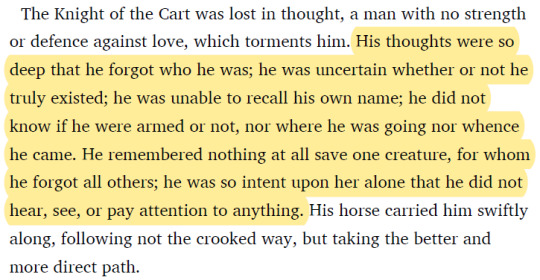
now you may have noticed that the text always links lancelot's episodes to his fixation on guinevere. we'd be here forever if we incorporated the way medieval authors offset the blame of their protagonists' deteriorating mental states onto the fault of a woman (see also: yvain/owain's madness when laudine/countess divorced him, tristan's madness out of longing for isolde, etc.) whereas when a woman shows upset, it's never attributed to her lover, but a shortcoming within herself. so for the sake of staying on topic, we'll focus on lancelot's symptoms as they are, rather than trying to unravel the middle ages-sized knot of misogyny that is the fictitious root of these madness episodes. "medieval attitudes towards mental illness" by edith a. wright discusses this trend in depth.
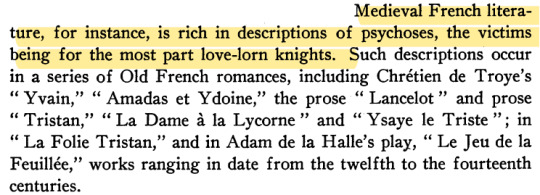
i'm going to be focusing on "the vulgate cycle" as my main source of lancelot's madness as he has multiple distinct episodes in that text written in excruciating detail that we can discuss. generally speaking, lancelot is presented as an extremely anxious individual that's highly susceptible to outside influence (whether that be guinevere's, galehaut's, etc.) but that in and of itself is not necessarily indicative of mental illness so much as a rarely explored introverted quirk of his personality. as discussed in "of metal and men" by julie singer, it seems lancelot's at his most confident when operating as an anonymous knight and therefore not subject to the scrutiny of societal expectation.

this, however, can develop in extreme ways when lancelot is pushed past his limits, and he succumbs to a berserker-like state neither his friends nor family can shake him from. while imprisoned at saxon rock, lancelot has to be segregated from the other prisoners, despite galehaut begging to be housed with him, the jailers refuse as lancelot's psychosis is so intense that he'd kill his fellow hostages and thus neutralize the enemy army's advantage. lancelot's refusal to eat exacerbates his symptoms. [Lancelot Part II, Ch. 71. Lancelot’s Madness and Cure; Defeat of the Saxons and Irish; Lancelot, Galehaut, and Hector Become Companions of the Round Table]

this psychotic episode continues even after lancelot is freed. eventually guinevere is forced to lock him alone in a room to protect the others, as he continues to attack anyone who comes near, including his own younger cousin and squire lionel who had attempted to talk him down and was struck. lancelot only recovers after his adoptive mother, the lady of the lake, arrives and utilizes strikingly modern de-escalation techniques, such as referring to lancelot by his childhood name to ground him, administering some medicine to help him sleep, allowing him uninterrupted rest, and then bathing him. (this is tinged with medieval mysticism, of course, but you get the idea.) the lady of the lake then instructs guinevere on how to care for him thereafter. once lancelot awakens from his magic/healing-induced coma, his sanity is restored.

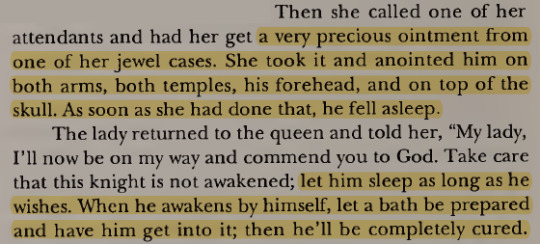
it feels important to note here that, once lancelot regains his senses, he feels ashamed of his behavior, and worries that his mental instability would cause guinevere to love him less. but she assures him that she loves him and is committed as long as they both live. even in medieval times, people recognized that a strong support system was of utmost importance for the mentally ill to thrive.

lancelot is, for the most part, stable for a time after this, contented to live at sorealis with galehaut (and guinevere for a bit as well). but growing restless, lancelot leaves galehaut's company to go adventuring. through some misunderstanding, galehaut believes lancelot had died, and thus dies of heartbreak himself. on discovery of his beloved's tomb, lancelot grieves so bitterly that he intends to kill himself on the spot. [Lancelot Part IV, Ch. 120. Lancelot Discovers Galehaut’s Casket and Defends It; Lancelot Rescues Meleagant’s Sister]


it's here that a messenger of the lady of the lake arrives. the lady had been informed by her oracle that this would happen, so acting quickly, she sent someone to intervene. the messenger takes the sword from lancelot and immediately gives him a task, one that would exhume galehaut and bring his body to where lancelot would eventually be buried beside him. in the short term, this prevented lancelot from harming himself, and in the long term, guided him toward shifting gears long enough that he eventually overcomes his grief through completion of his lady's instruction.
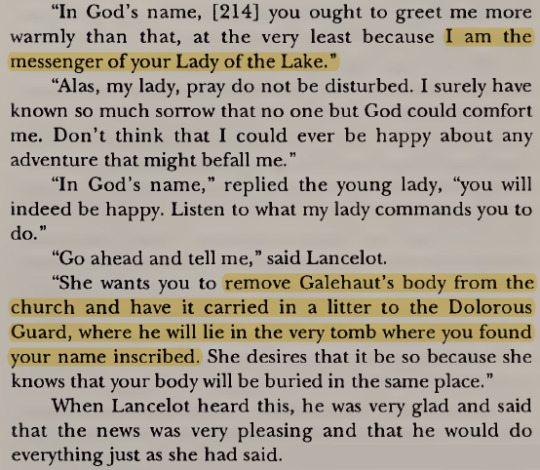
the next time lancelot is driven mad is after he is beguiled by elaine of corbenic into bed with her at camelot. (this is the second time, galahad had already been conceived). [Lancelot Part VI, Ch. 176 Lancelot and Arthur Go to Gaul; Claudas Abandons Gaunes; King Pelles’s Daughter Deceives Lancelot; Guenevere Expels Lancelot]
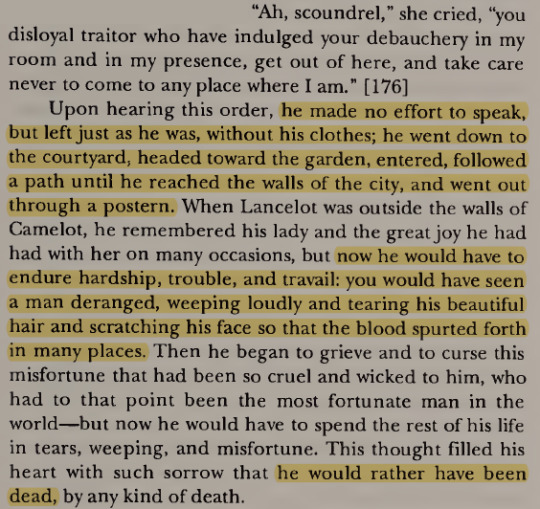
at this point, lancelot is beyond the reach of even his mother, the lady of the lake, so this psychotic episode persists for many years. he's declared missing and all of the knights set out in search of him, to no avail, and he is assumed dead. lancelot, meanwhile, survives the winter by attacking people and stealing their resources. [Lancelot Part VI, Ch. 178 Lancelot’s Madness and Subsequent Cure]


eventually, while lancelot is subdued in a deep sleep, a pair of charitable brother knights, recognizing that lancelot is unable to care for himself and a danger to those around him, successfully transport him to their castle. they don't know who he is. they keep him chained for safety but feed and clothe him. during this time, lancelot mutilates himself to be free.
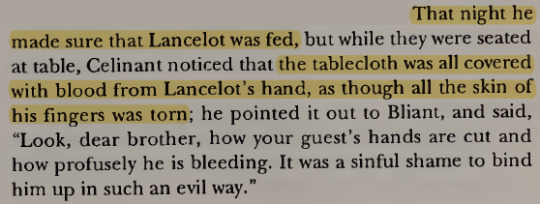
eventually, lancelot is calm enough to be freed from his bindings, and lives with the brothers in this way for two years. he eats little and completely loses touch with his identity and the reality of the world around him.
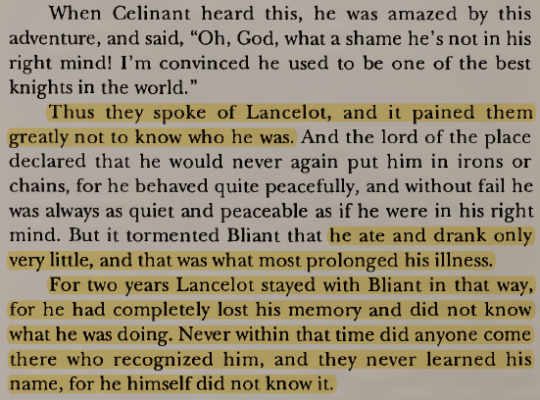
but one day, lancelot looks out his tower window and sees a passing boar. he's compelled to follow it and departs the castle of the brothers without a word. he ends up in a battle with the boar which he barely survives. a holy man happens upon him and tries to administer healing, but lancelot attacks him.
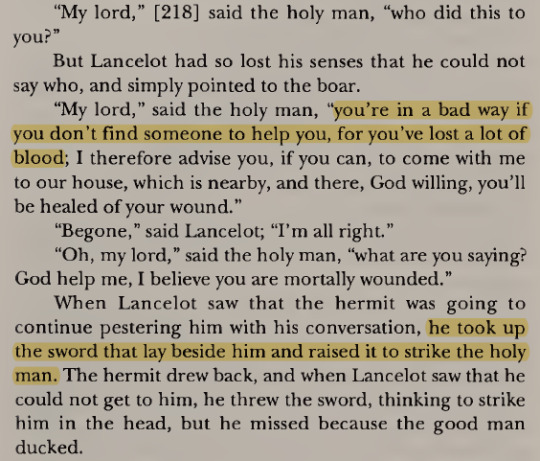
after this the holy man flees and enlists the help of some men-at-arms, who assist in capturing lancelot and forcibly strapping him to a litter to be drawn away. ultimately, despite the best intentions, lancelot's condition only worsens.
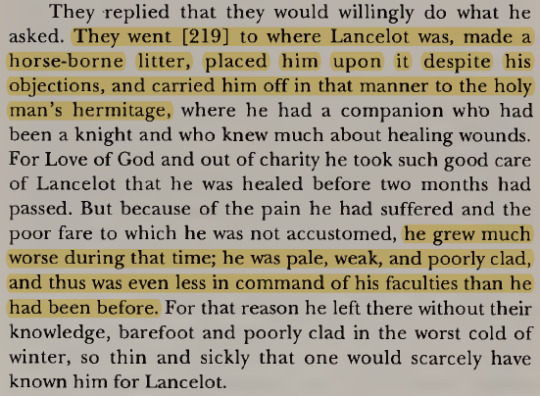
i'm going to make a brief aside here as this reminds me of an article i read detailing a similar situation which occurred in real life. in "the enemy inside" by brian burfield, john of ancaster suffered mental distress as a result of the war in france, subsequently inflicting harm on himself and others. in this case, it was his father that restrained him into a horse-drawn cart, and brought him to a place of healing which was revolutionary of the time period, as friar bartholomeus recognized the connection between trauma and mental distress without attributing it to demonic possession, thus attracting many people in need of help to his monastery for treatment. so there is, at least in part, historical precedence of similar occurrences.

anyway, back to lancelot. he eventually flees from his intended caretakers yet again and wanders to the town of corbenic. there the children recognize his madness and begin to harass him, throwing stones and sticks, until he's incited to retaliate and wounds anyone who crosses him. eventually he wanders into the castle itself. the courtlings recognize he's mad, and feed him scraps. satiated, he literally curls up and sleeps on the floor like a dog. it's this, at last, that allows him to begin the slow recovery to wellness.

finally, after all these years, someone recognizes lancelot for who he is. none other than elaine of corbenic.

she tells her father pelles and he concocts a plan to capture and cure lancelot using the power of the holy grail. so as the times before, they wait until lancelot falls asleep, and bind him up. then at long last, his senses are restored.

when lancelot awakens from his stupor, he knows not how he got there, but begins walking upright and talking coherently again. he implores pelles to explain how he came there. once up to speed. lancelot is grateful no one but pelles and elaine recognized him. now let it be made clear that while lancelot's psychotic episode had finally concluded, he's not otherwise alleviated of mental anguish. he's still depressed about his banishment from logres and camelot, and deeply ashamed of his many years spent mad. thus he requests of pelles to live somewhere far away, where no one but pelles and elaine will ever recognize him.
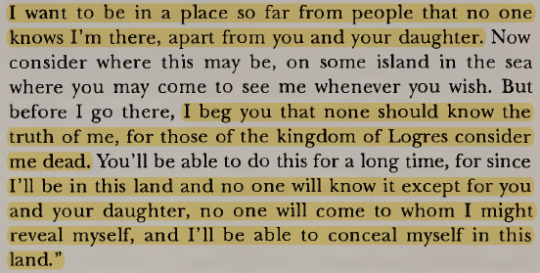
so an island with a castle is located on which lancelot can live and he, together with elaine and a small court, go there to stay. lancelot loses his knightly abilities and instead takes up the daily ritual of subjecting himself to painful memories of logres, which then in turn bring him "relief" and "comfort". an apt description of rumination and self harm.
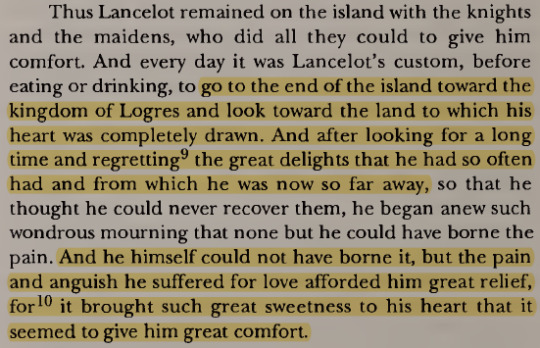
eventually, lancelot sends a secret message back to the land of logres intended to entice people to the island to fight him so he can relive the glory days.

in the end, it's lancelot's own half brother hector along with young and newly knighted perceval who find lancelot on the isle of joy. hector tells lancelot that the queen summons him, and lancelot immediately prepares to leave. on hearing this, galahad tells his grandfather he'll go and lodge in the abbey run by his great aunt, so that he might be nearer to his father. [Lancelot Part VI, Ch. 179 Hector and Perceval Find Lancelot, and They All Return to Camelot; Galahad’s Arrival Is Announced]
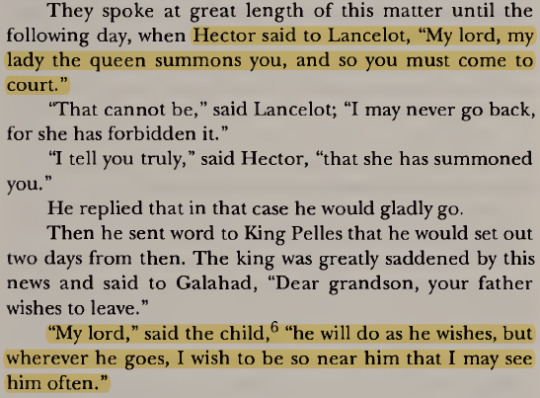
and with that, lancelot reenters society with his brother and son, which kicks off the grail quest in the subsequent book. that's a lot of info and reading, but all this to say that yeah, lancelot is known for his mental instability, to say the least. thanks for the ask!
#arthurian legend#arthurian legends#arthuriana#arthurian mythology#sir lancelot#lancelot#mental illness#ask#anonymous#my post
75 notes
·
View notes
Text
Okay, guys! SAS really wants me to talk about the origin of "Endogenic" in relation to systems...

So let's go!
Endogenic System was coined by @thelunastusco in 2014.
There. Done.
I'm glad we all did that!
Oh, wait! They wanted me to talk about this claim!

Yeah... so... I can't find any evidence that Freud actually used that word in this way...
What's being cited here is a book called "The Trinity of Trauma: Ignorance, Fragility, and Control: The Evolving Concept of Trauma / The Concept and Facts of Dissociation in Trauma"
The author uses the word endogenic or refers to endogenesis of various disorders 21 times in this book according to Google.

This is, so far as I can tell, the author's own phrasing. Not Freud's.
And the book was published in 2015, a year after the term endogenic had already been in used by the plural community.
Actually, even framing "hysterical neurosis" as the first diagnosis of multiple personalities is a bit misleading.

Hysterical neurosis was a VERY broad diagnosis that in turn had a dissociative subtype that in turn included multiple personalities as one possible symptom. So even if this could be traced back to Freud, it wouldn't be explicitly about DID, in the same way we shouldn't treat every single mention of Schizophrenia from this period as being about autism. (Since ASD was considered a subtype of Schizophrenia at the time.)
But that's really beside the point. There's just no evidence that I've been able to find where Freud reffered to this as being. I'll admit, I could be putting in the wrong search terms. And it's hard to sort through a century of academic papers. But as it stands, I haven't found a source showing "endogenic" being used to refer to the fantasy model before this book in 2015. And if it was, it's at least uncommon enough that you wouldn't find it unless you're explicitly looking for any usage of the word that could make for a solid smear campaign.
Which really is what this is.
Just like how anti-endos claimed "natural multiplicity" was ableist and suggested traumagenic systems were "unnatural," when any good faith reading would suggest that it was intended in a nature/nurture context: Having a natural cause, as opposed to an environmental one. (Although I will admit the term did get muddled and start to lose meaning once it started including supernatural multiplicity and created systems.)
Or how anti-endos have said tulpas and thoughtforms are appropriative despite Tibetan Buddhists generally not caring.
Or, conversely, how they try to make trans systems calling them "sysmeds" out to be transphobic.
Ultimately, these are not good faith criticisms, and never have been.
Whatever term is used, anti-endos will always look for whatever they can to delegitimize us and spread hate.
#syscourse#pro endo#pro endogenic#endogenic#plural#plurality#system#plural system#multiplicity#systems#endogenic system#psychiatry#mental health#psychology#actually endogenic#actually a system#tulpa system#plural community#hate group#hate groups
173 notes
·
View notes
Note
what a niche whump thing you enjoy?
hi, hello, sorry for replying to this so late but thank you so much for the ask!
here’s some niche tropes i love (some are more hyperspecific than specifically niche but you get the spirit)
oxygen masks! everything about them!! the way the fog up and obscure whumpee's face, making their status as Sick Person faster noticed than their individual personhood; the way they muffle whumpee's voice when talking, especially if they're very weak; as a matter of fact, i'm also feral about them being gently instructed not to talk while on oxygen; all these are even better when you make whumpee all sleepy and delirious on top of everything
warm compresses! we all know and love cool cloths for fevers and whatnot, but i see little appreciation for the toasty ones which is a shame because warmth is something so comforting and kind; speaking of compresses, i also have an oddly hyperspecific liking for when they're put not only over the forehead but also the eyes; also when the cloth catches some of the bang hairs underneath it>>; also consider all that but with whumpee being bathed and caretaker gently putting a warm water-soaked washcloth over their eyes MMM YEAH.
whumper being gentle and kind. and I don't even mean necessarily in a "creepy comfort" kind of way(though that smacks too) - more like, despite being a whumper, they're kind, patient and empathetic towards whumpee's struggle (even if a lot of it was inflicted by whumper themselves). what perfectly evokes that vibe i'm thinking of is that post.
whumpee falling asleep in a warm bath post-rescue. what else can i say
man, something about *professors* in whump. creepy genius lecturer who does unethical experiments or is a serial killer, maybe their whumpee is a helpless student... on the flipside, consider professor whumpee - something about someone smart, fortified in their ivory tower, perhaps emotionally detached, getting their absolute shit rocked; also consider a hurt/comfort scenario where they get cared for by another academic fellow or even a student (live laugh love role reversal). what about caretaker professors - imagine them being very gentle and protective over their students, perhaps caring for them like their own children when sick or otherwise Woed in some way.
doctors, anatomy lecturers, surgeons and such as serial killers!! or maybe torturing someone!! they're skilled with the knife, know all the ins and outs of the human body and use the knowledge they were given for the sake of good to be evil instead.
as mentioned above - role reversals!!! one of my favourites is doctor-turned-patient: they can understand exactly what's happening to them and how they'd treat it but now they're forced to put their life in the hands of others just like countless people put theirs in their hands (even better if their medical team is made up of colleagues - consider the possibility of them being cared for by friends or workplace rivals<33)
grief as emotional whump!!whumpee struggling to get out of bed and take care of themselves,the sheer trauma of it all, being constantly panicked, angry and depressed, the possibility of developing complex grief/PTSD(with all the tasty symptoms)
kind resraints <33 having to tie up a traumatised, overwhelmed whumpee after rescue because in their blind panic they keep on trying to elope or hurt themselves and others, maybe even gagging them so that they can't bite; reassuring them that it's for their own good and because caretaker(s) loves them; caretaker ensuring to restrain them as loosely and gently as possible, using the softest of cloth; also caretaker being absolutely heartbroken seeing them like that and feeling unbearably guilty that they have to do it
blanket burritos!! plz i need more content of whumpees being swaddled and cuddled till all their anxiety or chills or pain or anything leaves them as they drop into deep sleep
as a matter of fact,in hurt/comfort we also need a loooot more non-sexual direct skin contact. not just as means of emergency rewarming in case of hypothermia but generally for the sake of comfort and closeness
something about passive voice..."they were"+choked", "tied up", "dragged", "sedated", "held", "cleaned up", "warmed", "cuddled"...
this is extremely obscure but you know how sometimes in movies ,when captive whumpee is gagged with a cloth or something, by the pattern of the fabric you can tell that it was something random like a kitchen towel grabbed on the go? yeah...(esp in a domestic whump scenario); also when said cloth (or maybe also even the ones used for the ropes) is torn from whumpee's own clothes? good shit (something like that happens in the green knight, this movie is peak whump, h/c and angst material, begging y'all to watch it)
SCHOOL/CAMP BULLIES!!!!! love the trope of some poor nerd being used for some abusive prank. even better if a teacher is caretaker afterwards
in film: that dim, orange-ish lighting when we get a shot of restlessly asleep feverish whumpee in bed
ive made a post about this already but: whumpee with long, luscious hair getting it agressively chopped off(with a knife, even??) by their enemies when they're captured to humiliate them
caretaker calling whumpee “buddy”
whumpee's parent being caretaker!! imagine them gently caring for a delirious whumpee who clings to them, weakly calling out "mom/dad?". even better if whumpee is a grown adult now; just as good - whumpee's parent being their whumper! (maybe even the actual archenemy/villain of whumpee if they're a hero). imagine them torturing them and whumpee crying out "mom/dad, you're hurting me!" again, even better if whumpee is all grown up.
lmao this turned out RIDICULOUSLY long, im sorry if its incoherent, its 3am here and i power through by the force of a chocolate bar and the will of god. anyways, i hope you enjoyed, if anyone writes something inspired by these tropes plz plz share with me, id eat that shit up.
(everyone plz keep on sending me asks, answering them is so fun<33)
32 notes
·
View notes
Text
a lot of people like to begin and end their research into the possibility of endogenic systems existing by merely aggressively pointing to the DSM5 definition of dissociative identity disorder and using this to make some complex claims like:
"dissociative identity disorder is only ever formed by early childhood severe trauma, and so if you don't experience disordered symptoms of plurality, you don't have dissociative identity disorder, therefore you can't be a system."
however, if you ever bothered to look more into psychological literature, as you should before making grandiose sweeping opinionated claims with insufficient research backing, you'd know that the experience of plurality is actually, within the psychiatric community, discussed heavily.
there are plenty of paradigms where you can find things analogous in description to nondisordered, therapist-endorsed plurality, including therapeutic methods of engaging with oneself as plural as a means of Improving oneself: for example, Schema Therapy (often utilized with borderline patients and people with personality disorders), and Internal Family Systems (often utilized in general types of patients, whether or not they were severely traumatized as a child or even as an adult or adolescent)
as a side note, it's very anti-intellectual to have rabidly-held opinions that you bully people online about without even bothering to do a ton of research, especially into perspectives from academics that disagree with your personal very online opinions. any serious practicioner of psychology would be one who is open-minded and seeking to not Confirm a Theory but to learn and form new ideas based on what their clients can teach them.
it's also quite offensive towards survivors of psychiatric abuse to insist upon the psychiatric system of diagnostics as the end-all-be-all of one's existence, and it smells like major bootlicking to only ever allow oneself and others to be ~valid~ If an authority confirms it. it's not like the DSMs are these perfect encapsulations of everything ever that could happen psychologically, things are added and removed all the time, and those actions often accrue significant behind-the-scenes debate in the academic sphere, where people with write papers on why they think something should or shouldn't be there. remember, the DSM is simply supposed to be a Tool that Guides clinicians in order to help them distinguish certain phenomena from others, but at the end of the day not only is it Not supposed to focus on nondisordered manifestations of behaviors, but it's also not made to reductively simplify any active debate in psychiatry merely because one thing is canonized a certain way, just so you can be Right Online™
anyway. in schema therapy, schemas are said to be parts of people that hold certain typified negative self-belief systems, and patients are encouraged to both label them and speak to or as them, in order to convince their parts of new and more healthy or productive modes of thinking, rather than getting triggered into letting the schema take over and give them negative thoughts and emotional issues.
these parts are understood within the literature to be natural to everybody, because everyone compartmentalizes into belief + emotional structures like these; what makes them 'not dissociative identity disorder' is merely the fact that these parts do not cause amnesia when taking over the core self, and that they are often identified as 'parts' of the primary person, rather than fully separated other people with distinct consciousnesses. nonetheless, this is one of many examples of the parts work methodology wherein the self is casually understood to be multiple or have subpersonalities or parts within psychological literature, and that fact is then taken towards the conclusion of using this experience in a healing-oriented way.
here is an example of schema therapy, an excerpt of A Client’s Guide to Schema Therapy
by David C. Bricker, Ph.D. and Jeffrey E. Young, Ph.D.
who are from the Schema Therapy Institute;
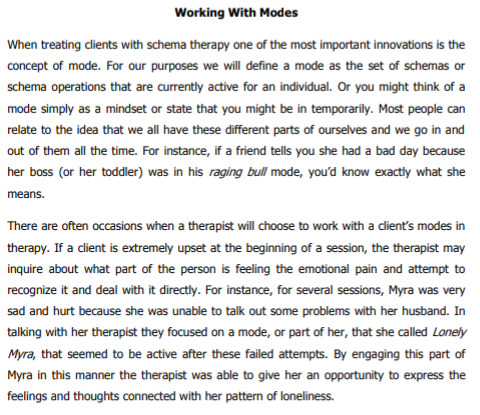
moving on, there is my other example: internal family systems. in IFS, clients are encouraged by their practitioner to personify and then actively dialogue with their various emotional states and common modes, and also to look for particular styles of parts already well-known by the IFS paradigm such as 'firefighters' and 'managers,' which are two different kinds of protector parts. with IFS becoming popularized nowadays, more and more laypeople are now becoming comfortable with the idea that they have psychological parts, which can be parts of their personal Self or parts that exist within them and hold certain emotional functions, despite perhaps not experiencing the typical heavy dissociative states definitive of disordered types of multiplicity like DID.
here are some excerpts from a book called The Others Within Us, by Robert Falconer, with a foreword by Dick Schwartz, the founder of IFS, as well as many high praise reviews from members of the psychiatric community for his writing, which breaks new grounds and is very in-depth and thorough.
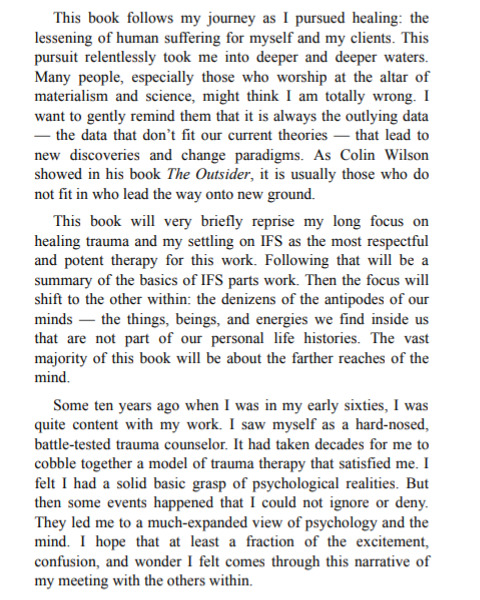
here he discusses needing to have an open mind towards phenomena that are not well-studied yet, and learning to humble himself in order to do so even as a trained clinical trauma counselor in his 60s and 70s at the time of studying and eventually writing this book.
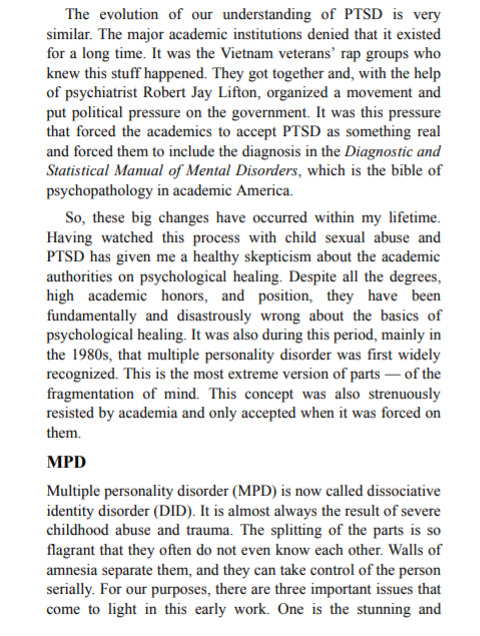
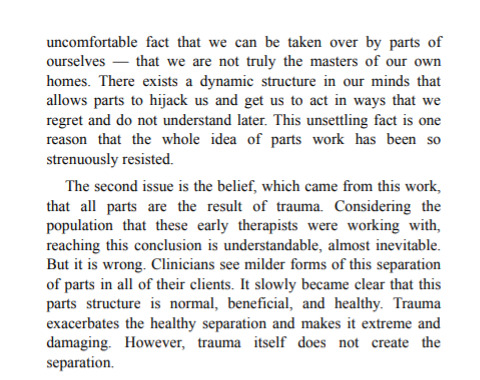
first of all, take note of his discussion of the contestation of even PTSD when they were trying to get it canonized in the DSM. an entire movement including political pressure had to be formed just to get ptsd into the literature. nowadays nobody on this website would (hopefully) contest the validity of ptsd as an experience people could have, but back then, people had to hold their ground against the psychiatric system and even the government just to prove that their experiences deserved to be taken seriously. don't think that this was the olden days either, because the academic world still tends to hold tight to its current state and not be welcoming towards experiences outside its own paradigms, so its good to keep in mind that there are histories and politics going into the making of all this psychological literature, with more room yet for even further and more uncommon experiences to be discussed.
second of all, note that he says that to clinicians working even with people with MPD/DID, it became apparent that the parts structure could be normal for people, beneficial, and even healthy, and that it was simply the severely dissociative aspects of it that they would work to heal, rather than viewing the entire experience of plurality as inherently disordered or solely a product of trauma.
i hope its clear by now that there's a lot of discussion surrounding this issue, but that plenty of it involves the normalization of nondisordered plurality, that plurality can be even healthy and a good, therapist-approved means of self-exploration for people, and that you should not cherry-pick literature while using intellectually dishonest argument techniques online.
endos are valid imho. i myself am a dissociative system, but at least i don't claim that my opinion is the standard opinion based on just that, i actually try to do my research. hopefully this was interesting to you, and please don't discourse on my post. kthxbai
#syscourse#dissociative identity disorder#did system#traumagenic system#endogenic system#actually multiple#original post
18 notes
·
View notes
Note
Hi, there. I'm seeking more scholarly, academic or formalized information on endogenic plurality. Could you recommend books? Thank you.
We don't know of any books, but there are academic articles on endogenics!
General Articles:
Enacted Identities: Multiplicity, Plurality, and Tulpamancy: It's talking about plurality, but is heavily focused on the non-traumagenic sides of the community.
Multiplicity: An Explorative Interview Study on Personal Experiences of People with Multiple Selves: One endogenic system took part in the study, and the researchers discuss their overall findings and the possibility of some sort of hereditary component to some systems.
Dissociation and Transformation: Talks about the possibility of dissociation being a symptom of good health, rather than always pathological.
Dissociative Experiences in the General Population (pdf): Surveys a city for dissociative experiences, and found that at least some spontaneous dissociative experiences may be due to endogenous factors.
Alterity: Learning polyvalent selves, resisting disabling notions of the self
Differences Between Trance Channeling and Multiple Personality Disorder on Structured Interview: Compares trance channeling and MPD (what is now called DID), and concludes that differences in experiences may have to do with whether they're trauma-based or not. (Channelers aren't necessarily endogenic, but it does go into why despite having multiple identities, trance channelers don't have DID. This may be relevant for some forms of spiritual endogenic plurality.)
New Age 'Channeling' and Theories of Dissociation: Applying a 'Structural Dissociation of the Personality' Model to the Case of Jane Roberts: A really good thesis comparing a famous channeler (Jane Roberts) with dissociative identity disorder. (Channelers aren't necessarily endogenic, but it does go into why despite having multiple identities she didn't have DID. This may be relevant for some forms of spiritual endogenic plurality.)
Soulbonding:
The illusion of independent agency: Do adult fiction writers experience their characters as having minds of their own?
Uncharted features and dynamics of reading: Voices, characters, and crossing of experiences: Many readers seem to hear the voices of the characters they're reading about in books as they're reading it, with a rare few even hearing their voices even after they're finished reading.
Most Authors Can 'Hear' Their Characters' Voices Talking to Them, Survey Reveals: Up to 63% of authors hear their characters talking to them, showing that this is a fairly common phenomenon.
Tulpas/Thoughtforms:
Tulpas and Mental Health: A Study of Non-Traumagenic Plural Experiences
Varieties of Tulpa Experiences: Sentient Imaginary Friends, Embodied Joint Attention, and Hypnotic Sociality in a Wired World
Learning to Discern the Voices of Gods, Spirits, Tulpas and the Dead: compares and contrasts tulpamancy and other communities centered around voices, spirits or disembodied entities
Hopefully this helps! If any of our followers know of any books talking about endogenic plurality (or any other resources in general) please feel free to add on!
#plurality#endogenic#actuallyendogenic#positivelyplural#tulpamancy#soulbonding#information#academic#articles#research
116 notes
·
View notes
Note
Love your blog and all your analysis!!
Many people didn't like S2 because Simon, according to them was just a tool to drive Wilhelm's story, a love interest only and didn't really have his own story. In particular, many are frustrated at the lack of narrative on the video's effect and Simon's subsequent trauma. Of course, everyone's allowed their opinions but seeing as you have experience in the world of writing and making tv magic, wanted to get your insight on this. Thanks, a S2 fan! 💜
Hi anon! Thanks for the question.
I’ve already written pretty extensively about Simon’s arc in season 2 and why I like it in this post. In short, I think he grows a lot in season 2, but his growth takes him towards emotional vulnerability and openness, which is not something we’re used to seeing in characters (especially not male ones).
I also don’t mind how they address Simon’s trauma in season 2. I’m going to approach this momentarily not as a writer, but as someone who has been in therapy for years. There are some traumas that have happened to me (like a serious car accident when I was a kid) that are very concrete, with a set beginning and end, and that began to affect me right away. (I had ptsd symptoms pretty immediately after that accident). But there are other traumas that feel like a series of small cuts instead of one big punch. It’s harder to decide where they begin and end, and their effects are more subtle. Sometimes it takes me years to even realize that they were traumatic and that they are still affecting me. (The medical trauma I’ve experienced as an adult over several years is like this). To me this is more what Simon is dealing with with the video. Once the video goes online, it’s not coming down. There’s no set end date, and Simon spends most of season 2 not even knowing who the perpetrator was. He’s in the kind of no-man’s land between the initial blow and coming to understand how the whole process has affected him. That being said, I do think we see some changes in him that reflect what he’s gone through. He seems to care a lot less about his academic classes than he did in season 1. He’s writing music in an attempt to process what he’s been through. And you could even see his attempt to have sex with Marcus as a trauma response. The last time he hooked up with someone his agency was taken from him. So it makes sense to me that he’s eager to have sex again but fully on his own terms, to partially erase that feeling of not being in control. I don’t know for sure if this will happen, but I wouldn’t be surprised if we see more traditional ptsd symptoms from Simon in season 3. If there’s some sort of legal action against August that would signify a sort of “end” of the video trauma, and would also probably be re-traumatizing in a lot of ways. I also think interacting directly with the royal family might stir up some things as well.
Ok, now I’m going to totally switch gears and approach your question from a writing perspective. Let’s talk about story structure for a minute, specifically TV story structure. Most TV has an A plot and a B plot (and sometimes a C plot too). In old school cable procedurals, the A plot would be the mystery of the week, while the B plot would be about whatever was happening in the characters’ personal lives. If there was an overarching mystery or storyline that tied the whole season together, that would be the C plot. As you can guess by how they’re named, the A Plot would take up the most time and do the most to drive the episode forward. The B plot is next most important, etc. Once shows started to become more serialized in the age of streaming, the concept of A and B plots changed a little bit. Now the plots are divided by character and theme. The A plot will be headlined by the protagonist and will explore the main themes of the show. The B plot will be headlined by a secondary protagonist, who doesn’t have as much to do as the A plot lead, but is still answering a dramatic question that relates to the central themes of the show. A lot of times the primary and secondary protagonists’ actions influence each other, but they don’t share a ton of screen time. (If they did, their stories wouldn’t be separate.) You can think of the A and B plot protagonists as two sides of the same coin. They’re intricately connected, they’re exploring the same ideas, but they rarely come face to face, and they often represent different perspectives on the same themes. Black Sails is probably my favorite example of this. (I’m not as active in the Black Sails fandom as I am in the Young Royals fandom, but Black Sails is probably my all time favorite show and I absolutely love all the ungovernable pirates over in the Black Sails tag. Shout out to them). James Flint is the main protagonist and headliner of the A story, but Max is the secondary protagonist that headlines the B story. Both are struggling with the question of how to achieve and wield power in an unjust world, and their political maneuvers consistently influence each other’s plots. They share a lot of secondary characters across both of their plots, but they themselves never interact. So that’s one example, and if you look around at your favorite shows you’ll be able to find lots that adhere to this formula, including, I would say, Young Royals.
I think a lot of people are kind of subconsciously looking for this kind of structure, and have decided that Simon is the protagonist of the B plot. I understand this, because we all love Simon. He’s really well written and acted, his personality is so compelling, and his chemistry with Wilhelm is great. I spend a lot of time writing him in fic (I’m the writer of all the Simon content in Heart and Homeland) so I understand this impulse. But if you were looking for Simon to be anchoring the B plot in season 2, you might have been disappointed. Because in reality I don’t think he’s the secondary protagonist. I think Sara is.
Sara is set up as a foil to Wilhelm, the main protagonist, in so many ways. I always say that the driving dramatic question of Young Royals lives with Wilhelm, and it’s something along the lines of “should I conform and live the oppressive life that was designed for me, or rebel and find my own path to happiness?” Sara is wrestling with a similar question that’s kind of the inverse of this; for her settling into a prescribed role in the Hillerska class system initially seems like a relief. So maybe for her the dramatic question is something along the lines of “is the price of fitting in worth it? Will it lead to true happiness?” They feel so much like opposite sides of the same coin to me.
So Sara and Wilhelm are both trying to define themselves in relation to their families and also the class system. This comes up in the similarities of their family structure (they both feel very connected to their class position through their families; they both have complicated relationships with their mothers and bad to negligible relationships with their fathers; they both have a deep connection to their siblings) and in the relationships they choose to embark upon. They’re both navigating a very serious and complicated first love. They’re both dating across class (in the opposite direction, a perfect example of the “different views on the same theme” aspect of primary and secondary protagonists). They both have concerns about how and when their relationships become public, and by extension are both playing in the sandbox of themes around privacy and authenticity that define so much of the show.
Both have difficulty regulating and recognizing their emotions. Sara seems to exhibit alexithymia, a common aspect of autism that makes it hard to recognize one's own emotions. Wilhelm has been taught to repress his emotions, which he does well until he explodes (like when he got into the fight at the top of the series or when he yells at his mom on the phone). He’s also managing a lot of physical symptoms of anxiety.
Both also struggle with questions of justice and how to make things right. In the beginning of season 2, Wilhelm is initially determined to destroy August because he thinks August will never repent, but by the end of the season he’s starting to realize that this was the wrong technique. He realizes this largely because of Simon; he only puts down the gun and walks away from August because Simon does first. Sara makes the opposite journey: she starts by trusting that August will change and repent on his own, but then she is forced to confront the fact that this is not true, and that she needs to use the legal system to bring August to justice. She makes this realization largely because of Simon, and seeing the ways that she has hurt Simon, in the same scene with the gun.
The other big argument in support of Sara as the secondary protagonist of the show is that she and Wilhelm never directly interact. Their actions affect each other all the time, but they don’t share a scene together. They’re living on parallel but separate story tracks.
Simon is a crucial character in both Wilhelm and Sara’s stories, but the fact that he is close with both excludes him from being a protagonist of his own plot line. (I would say the same about August, who is a catalyst for both Wilhelm and Sara.) That doesn’t mean that Simon isn’t well written. He has a very compelling character arc, motivates much of the plot, and his relationship with Wilhelm forms the heart of the show. But I think the reason people were disappointed in his story in season 2 is that they were expecting something from him that the structure of the show doesn’t support.
If you’re interested in reading more about A/B/C plot structures I found this website really easy to understand. Also shout out to @bluedalahorse for talking to me about Wilhelm and Sara and helping me articulate what I was trying to say here.
Thanks again for the ask, anon and for the vote of confidence in my analysis! I really appreciate it. If anyone else has a Young Royals scene or question they want me to break down from a writing or cinematography perspective, my ask box is always open.
#young royals#my meta#ask box#writing break down#simon eriksson#wilhelm young royals#sara eriksson#prince wilhelm
98 notes
·
View notes
Text
Everytime someone headcanons Annabeth as autistic but not Percy i take 100+ physchic damage.I have nothing against autistic Annabeth as long as it's coming from actual autistic people but you REALLY mean to tell me you think headcanoning the uptight and mean kid genius as autistic and the silly and kind one who hates academic work because of school trauma as allistic adhd isn't regurgitated ableist bullshit even though the latter shows the most blatant symptoms and autistic-coded storylines and relathionships in the whole franchise.Either make them both autistic or don't bother bitch
#i know this is mean.that's the point#annabeth chase#percy jackson#autistic annabeth chase#autistic percy jackson#leah is our annabeth#leah jeffries#walker scobell#platonic percabeth#ocean girl and wise guy#he/him lesbian annabeth supremacy#lesbiannabeth#butchbeth#black percy#latino percy#trans percy jackson#transfem percy jackson#perseo jackson#persephone jackson#bigender percy jackson#punk!percy#or#pastel punk percy jackson#depending on my mood#team parent percy jackson#pjo#pjo disney+#actuallyautistic#autistic girl summer#summerposting
20 notes
·
View notes
Text
(rant about linguistics, aphasia and q!quackity’s impairments post-memory loss!!! to anyone who knows more about any of this, PLEASE add on or dm me id love to learn if anyones into neurolinguistics or anything of the sort)
ive been digging deeper into q!quackity’s condition (because I quite literally CAN’T stop thinking abou it) + taking note of his symptoms/behavior and it seems like what he’s dealing with could be called alexia (acquired inability to read) with agraphia (acquired inability to write), which are types of general aphasia, except i still need to know MORE about his production and comprehension i need to get in there!!!!!
it seems like he could be experiencing literal/verbal alexia with agraphia, which would mean he can’t recognize written letters or symbols at all and that is why he’s unable to read (this is all very tentative… all i have to go off of is my psycholinguistics class and as many academic articles as i can read). from what ive seen, q!q hasn’t actually tried to read any signs out loud, there’s no verbal attempt or production of speech which would make sense if he really can’t recognize the alphabet. BUT. what bothers me is that he can speak spanish with no issues. since spanish has a high proximity between phonology and orthography, theory says people who are able to speak it should be able to read and write the phonemes. and he can’t — or hasn’t tried. THAT makes me think he Can recognize the letters themselves
to confirm this i would really like to see him try to spell…. Or just name a letter! if its confirmed he CAN recognize individual letters, then id say what we’re looking at is more like pure alexia (without agraphia) — only a reading impairment, which would cause him to be unable to Arrange the letters in a sensical order. Its tough to check any of this w minecraft as a medium…. with a keyboard (or, in rp, on a communicator/in chat) it’s kind of impossible to know if he’s clicking at random or actually Trying to seek specific letters. but ill say that the way he sometimes dictates what he’s intending to write makes me think he DOES have the visual of each letter in his mind, and just struggles to order them or accurately transpose them
its also interesting to me how theres no sign of a speech impediment. q!q could speak fine from the very first moment we saw him. all hesitation was modal/owed to circumstance and not actually tied to his production of speech. i think that has more to do with the memory part of things! it could be that the extend of his memory alteration only goes as far as his writing and reading do. speech and comprehension come first in regular human development, and those are the faculties he has kept mostly unaltered. there could also be an argument to make about this pointing spanish as his first language (like cc!quackity) and english as his second, which would explain the dissonance between his production in one language and the other — but given that last stream he did express knowledge of english, idk if its relevant
i dont know much about the actual anatomy of things but i think it’s interesting that most aphasia cases are caused by lesions on the left temporal-parietal lobe. AND that its also possible for aphasia to be caused by head trauma like a hard hit to the head or deprival of oxygen (due to drowning? food for thought).
psa i know the situation in canon could be a lot less deep than im trying to make it. i get that. i dont expect the writers team to have researched the symptoms to this extent, but i enjoy discussing it. this is part of my major and a big area of interest for me so i find it really fun :) ill keep reading on this topic as much as i can and reblog w more of my musings if i find more relevant info. baseline qsmp team please let me in i need to study q!q under a microscope (lovingly)
#literally its ALLLLLLLLLL I think about since the return stream#WHAT THEY DO TO HIM?#kit.txt#qsmp#q!quackity#kit.meta
34 notes
·
View notes